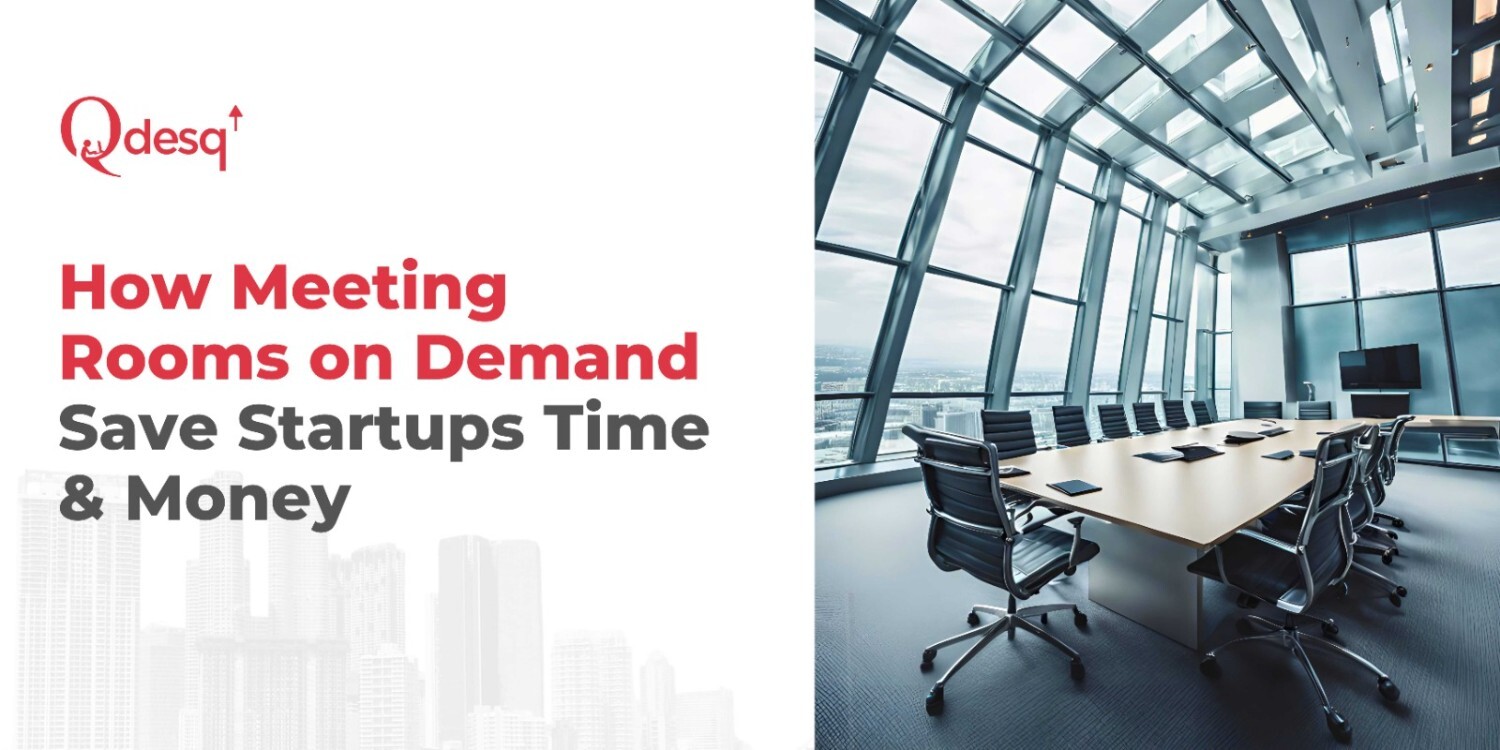Meeting rooms on demand offer startups a flexible, on-demand workspace for holding meetings without a long-term commitment. Instead of tying up capital in a permanent office, startups can book professional meeting spaces by the hour.
This pay-as-you-go model delivers cost efficiency and agility – companies pay only for what they use. By avoiding fixed leases and setup costs, startups free up resources for product development rather than paying for rent or unused office space. Many online platforms enable teams to compare and reserve nearby rooms instantly, eliminating the hassle of lengthy searches.
Cost Savings with On-Demand Rooms
Cost Savings with On-Demand Meeting Rooms
For early-stage Indian startups, every rupee counts. Owning or leasing dedicated meeting rooms, even in coworking spaces, can lead to underutilised space and sunk costs. That’s where on-demand rooms offer a more innovative solution.
Instead of committing ₹20,000–₹30,000 monthly for a fixed meeting space that sits idle most days, startups can book fully equipped rooms for just ₹300–₹1,000 per hour, only when needed.
This pay-as-you-use model means no overhead during off weeks or non-client days. Additionally, amenities such as conferencing tools, projectors, whiteboards, etc, are built-in, with no extra setup costs.
The result? Professional infrastructure, minimal spending, and complete flexibility—exactly what agile startups need.
Flexibility and Scalability
Agile growth is essential for startups, and on-demand meeting rooms excel in this area. As the company scales, it can simply book more hours or larger rooms on demand, then shrink back when demand drops. For example, if a startup suddenly lands a significant contract and needs to hold a large meeting with partners, it can reserve a large conference room for a day without incurring a penalty.
Conversely, if business is slow, it pays nothing for unused space. This “scale up or down at will” model avoids the cash burn of empty desks. According to The Executive Centre, flexible offices with on-demand rooms give startups “unparalleled flexibility” without upfront costs. In short, you get a nimble, use-it-as-needed footprint instead of costly fixed real estate.
Professionalism and Amenities
Startups also benefit from the professional quality of on-demand meeting rooms. These spaces are designed to impress clients and investors. Unlike ad-hoc venues (such as coffee shops or home offices), on-demand rooms come fully equipped with enterprise-grade Wi-Fi, AV gear, video conferencing capabilities, whiteboards, and ergonomic furniture.
A 2024 survey found that 65% of workers prefer well-equipped bookable spaces to makeshift alternatives. Walking into a modern conference room signals credibility; it shows you’ve planned well and take meetings seriously.
Amenities like on-site reception, printing, and even coffee or catering are often included. This allows your team to focus on the agenda instead of troubleshooting Wi-Fi or dealing with uncomfortable chairs.
As one expert notes, flexible offices give startups “access to professional, well-equipped environments that project a polished image to discerning clients and prospective investors”. In practice, this means you can pitch to investors in a bright boardroom rather than a library table.
Location and Convenience
On-demand meeting rooms open up a world of locations. Instead of being stuck in one part of town, startups can book spaces near clients, partners, or talent hubs. Many coworking spaces span both city centres and suburbs. For instance, data show that on-demand rooms in suburban coworking spaces cut commutes for local teams. By picking a central site for an all-hands meeting or an off-peak suburban venue for a team brainstorm, you save travel time and make attendance easier.
Convenience also means flexibility in scheduling. Meeting rooms can often be booked by the hour, half-day, or day via apps without lengthy notice. If an investor wants a meeting tomorrow, you can often secure a room the same day. This just-in-time booking is a contrast to the long lead times associated with conventional space. In summary, on-demand meeting rooms allow startups to meet where and when it’s most convenient, reducing logistical friction.
Scenarios & Use Cases
Meeting rooms on demand serve many startup scenarios:
Investor Presentations
Impress potential investors with a sleek, branded boardroom rather than a cramped café. As one analysis points out, “a startup hosting an investor meeting… benefits from instant availability” of quality space. This means last-minute pitch opportunities aren’t lost to venue hassles.
Hiring and Training
Interview and onboard new hires in a professional setting. Shared workspaces often feature hotel desks and training rooms, allowing teams to onboard or train recruits comfortably. In a strong startup community, you may spot promising candidates or mentors nearby.
Remote Team Collaboration
Periodically bringing a remote or hybrid team together can boost morale and alignment. 78% of workers value in-person interactions for team cohesion, but it’s wasteful to lease a whole office for that alone. Instead, startups can book an on-demand meeting room when they need a team offsite or a whiteboarding session and then return to remote work with refreshed plans.
Pop-up Workshops or Events
Testing new markets? Booking a one-off workshop or pop-up meeting in a new city is easy with on-demand space. You avoid long leases and can experiment with different locations until you find the best fit.
In each case, the key is saving time and cost. You spend minutes online finding a room, not weeks visiting offices. You pay for that morning or day, not a whole month. This lean approach allows startups to reallocate time and budget to product development and growth rather than focusing on space management.
Tips for Booking On-Demand Meeting Spaces
- Choose Convenient Locations: Book rooms that are easily accessible for your team and guests. A central address can save travel time and make a good impression.
- Check Amenities: Ensure the space has the necessary technology (projectors, video conferencing, strong internet) and comforts (coffee, breakout areas). A well-equipped room boosts productivity.
- Plan for Growth: Pick providers that let you expand easily. Can you book a larger room or multiple rooms on short notice? Make sure the provider offers flexible options in case your meeting size or duration changes.
- Leverage Community: Some shared spaces have strong startup networks. Consider a venue where you can mingle – it might help with hiring or partnerships. A vibrant community can serve as both a talent pool and a sounding board for ideas.
- Use Online Platforms: Compare options on workspace marketplaces. Platforms like Qdesq streamline the process by aggregating available meeting rooms and handling booking, letting you see pricing and reviews all in one place.
Conclusion
On-demand meeting rooms give startups a practical way to stay lean and agile. By avoiding costly fixed leases and lengthy setups, you save money and countless hours. Your team can meet in professional spaces that match the occasion, from quick video calls to big-pitch presentations, without any long-term strings. As more businesses embrace hybrid work, these flexible rooms are becoming a cornerstone of modern office strategy.











